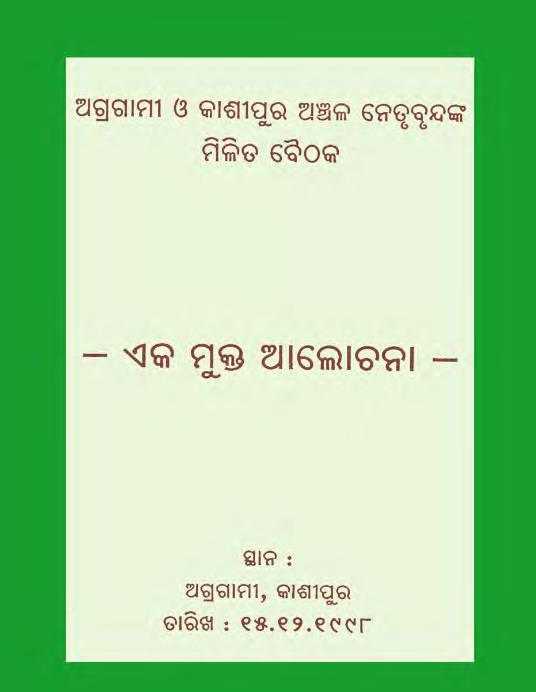In the heart of Odisha, the Kasipura region has long been known for its vibrant tribal culture and rich natural resources. The year 1998 marked a significant chapter in the development narrative of this area, primarily driven by the efforts of Agragami, a pioneering non-governmental organization focused on tribal empowerment and sustainable development. The Milita Baithaka convened by Agragami served as a critical platform for dialogue, planning, and implementation of various development initiatives aimed at enhancing the socio-economic conditions of the tribal population in the Kasipura Anchala.
The Milita Baithaka brought together representatives from various stakeholders, including tribal leaders, local government officials, development professionals, and various NGOs. This gathering served as a melting pot of ideas, reflecting the voices of the marginalized tribes in the region. The forum aimed to identify pressing issues affecting the community, share success stories, and brainstorm effective strategies for sustainable development.
Empowerment through Education: One of the most pressing concerns raised during the meeting was the low literacy rate among tribal populations in the Kasipura region. The participants emphasized the need for tailored educational programs that respect and integrate tribal languages and culture, ensuring that the content is relevant to the local context.
Sustainable Livelihood Initiatives: The meeting also focused on the importance of sustainable livelihoods. Many tribal families depend on agriculture and forestry for their survival, and there was a collective agreement on the need to promote organic farming and eco-friendly practices. Agragami proposed training programs to teach modern agricultural techniques while preserving traditional knowledge.
Health and Nutrition: Health issues, particularly those related to maternal and child health, were highlighted. The need for accessible healthcare facilities and awareness campaigns on nutrition was a significant point of discussion. Participants advocated for community health workers trained to address local health challenges.
Self-Governance and Rights: Another crucial aspect of the dialogue was the empowerment of tribal communities through self-governance. The Baithaka participants discussed the importance of recognizing tribal rights over land and resources, advocating for legal frameworks that protect these rights.
Cultural Preservation: The rich cultural heritage of the tribal communities was recognized as an invaluable asset. There was a strong consensus on organizing cultural festivals and activities that not only celebrate tribal traditions but also educate non-tribal communities about their history and struggles.
The Milita Baithaka organized by Agragami in Kasipura Anchala in 1998 was a landmark initiative that set the stage for transformative development within the tribal landscape. It galvanized local communities towards collective action, empowering them to voice their concerns and aspirations. As discussions materialized into actions, the community began to see gradual improvements in education, health, livelihoods, and governance. The spirit of collaboration fostered in the Baithaka continues to resonate, serving as a reminder of the strength and resilience of tribal communities in Odisha.
Agragami’s commitment to supporting these communities remains unwavering, emphasizing that sustainable development is not just about economic growth but also about cultural preservation, social equity, and environmental stewardship.
Books Info
| Books name | Agragami o Kasipura Anchala Netrubrundaunka Milita Baithaka/ଅଗ୍ରଗାମୀ ଓ କାଶୀପୁର ଅଂଚଳ ନେତୃବୃନ୍ଦଉଙ୍କ ମିଳିତ ବୈଠକ |
| Author | Agragami |
| No Of pages | 13 |
| Publisher | NA |
| Publication | 1998 |
| Printed At | NA |
| Distributor | NA |
Agragami o Kasipura Anchala Netrubrundaunka Milita Baithaka Sample
Agragami o Kasipura Anchala Netrubrundaunka Milita Baithaka Full Phd Download

